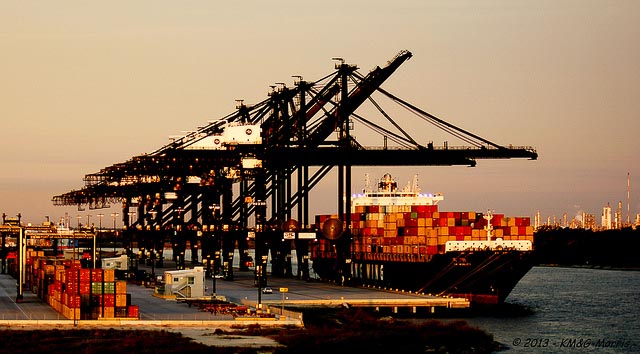Patrick Jankowski knew Houston ranked high even before he started his first-ever assessment of the region's role in the global economy.
"That was personal knowledge," said Jankowski, the Greater Houston Partnerships' vice president of research, of Houston's $517 billion economy that ranks just after Nigeria and Poland and ahead of Norway and Belgium in gross domestic product. "This was an opportunity to get that information out to a broader audience, to get people to know how big Houston is on the global stage."
But Jankowski's report with the Greater Houston Partnership, "Global Houston," sought to get beyond that headline-grabbing number to understand exactly how Houston's economy interacts with the rest of the world. Some of his findings caught him by surprise.
He discovered that at least 5,700 firms in the region engage in global commerce, far more than he had suspected. That's three times the number of globally-engaged firms as the last time he saw the number quantified, back in the 1980s.
The regional economy has a foothold globally in part because of the large size of its foreign-born population. Houston has more than 1.4 million foreign-born residents, a figure so large it eclipses the entire population of Dallas. At 22.6 percent of the total population, Houston's foreign-born population share trails only Miami, Los Angeles and New York.
That large immigrant population has made the region's economy an attractive destination for foreign-direct investment, especially from Asia, Jankowski said.
"If they want to build a plant or an office, they want to know if there's an immigrant population of ex-pats here," he said. "Having a large immigrant community says 'we accept people and your employees will be comfortable here.'"
The report identified more than 600 foreign-owned companies with locations in Houston, accounting for more than 150,000 jobs.
A previous report by the Brookings Institution found foreign firms provide about 8 percent of the Houston metro area's private jobs, whereas the national average for large metro areas is 5.5 percent.
"At a time when jobs are scarce and corporate investment still trails pre-recession levels, (foreign direct investment) offers a fresh injection of capital - frequently backed by the latest technology - from outside of the U.S. economy," wrote the authors of that Brookings study.
Brookings pegged a few of the reasons foreign-direct investment benefits a region.
Foreign companies pay 28 percent more on average than domestic firms, Brookings found.
Foreign firms also infuse new money into a region, accounting for more than 15 percent of capital investments nationally despite providing just over 5 percent of jobs. The Greater Houston Partnership found $12.5 billion in regional capital investments since 2011 came from foreign firms. More than half of it went to the manufacturing sector.
Brookings also found foreign investment drives productivity gains by delivering new technologies, management practices and production processes to an area, which can then seep into the rest of the regional economy. It found foreign investment accounted for 12 percent of national productivity growth from 1987 to 2007.
Jankowski attributed many of these benefits to the region's high share of foreign-born residents.
"When you leave your homeland, you don't sever ties with where you came from," he said. "It helps us sell goods overseas. Someone you know may be looking for a partner."
Foreign investment in Houston also has helped fuel the area's real estate boom. Historically, foreign real estate buyers have put their money in places like New York, Washington, D.C., Boston, Los Angeles and San Francisco.
But strengths in Houston's market for office space - low vacancy rates, coupled with expectations for continued high demand for space due to both job and population growth - make it an attractive place for foreign firms to buy large, high-profile properties.
The Greater Houston Partnership found 96 foreign buyers were responsible for 400 real estate transactions, bringing in more than $12 billion since 2001.
In particular, foreign buyers favor "trophy" office buildings. Houston has 32 skyscrapers, defined as those above 490 feet. Collectively, they have an appraised value of $9.5 billion. Foreign investors own, co-own or financed 11 of them worth a combined $4.3 billion.
"People don't appreciate how important it is when someone invests billions into Houston that they could have invested anywhere else in the world," Jankowski said.
While the current study didn't identify any weaknesses Houston, Jankowski acknowledged that the city's transportation infrastructure and congestion hurts trade. Those factors could be included in another forthcoming study on the challenges that could be a road block to Houston reaching its full economic potential.
"I think everyone around town understands our transportation issues, but I don't think they associate them with ties to the global economy," Jankowski said. "If you don't have an adequate road system, you can't get your goods to port so they can go overseas."

